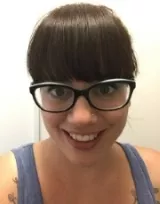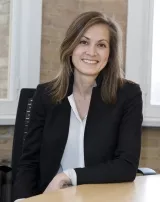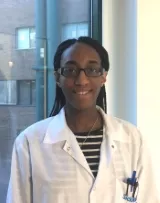HBSc Alumni News
Dagmara Zawadzka (H.B.Sc. in Anthropology, 2005) studies Canadian Shield rock art and Indigenous arts. She has recently collaborated on the first ever virtual exhibit of rock art in Canada ˗ ‘Images on Stone’ ˗ created by the Musée de la civilisation à Québec and Université du Québec à Montréal. She has also published an article in Time and Mind. The Journal of Archaeology, Consciousness and Culture (2019, vol. 12, issue 2) entitled “Rock art and animism in the Canadian Shield” that examines how rock art functioned within relational ontologies. (Posted July 3, 2019)
Marjo Asselsberg: Teacher (High School Science and Social Studies)

Marjo got her HBSc at UTM in 2014, and her BEd from Queen's University in 2015. She is currently teaching High School Science and Social studies in Calgary, Alberta.
“The art of being a good teacher lies in the ability to connect students with the material in ways that are meaningful to them. Making a learning experience meaningful is definitely easier when you have the ability to understand and appreciate different cultures - what better way to connect a student to the material than by making it relevant to their own way of life? Anthropology has greatly influenced my teaching style and skills, as well as enriching my ability to teach courses such as Social Studies and History in ways that examine cultural and historical evidence. I encourage my classes to draw their own conclusions, rather than just being told what to think and know.
Personally, I feel that I now have a better understanding of who I am and how I fit into society and the world, and that I can make better decisions because of that. My ability to consciously and conscientiously sculpt the world in which I live only exists because of the eye-opening learning experiences I gained from studying anthropology. I encourage every student I teach, whether I'm in a science or social studies class, to take at least one anthropology course so that they, too, can be thoughtful future movers and shakers."
Andrea Chan: Orthopaedic Surgeon

"I am a 2005 graduate from the University of Mississauga’s Forensic Science and Anthropology Departments. After graduating from UTM, I completed my Masters’ degree in Forensic and Dental Anthropology under the supervision of Dr. Shelley Saunders at McMaster University. At McMaster, I had a privilege of meeting Dr. Dennis Willms and was introduced to the field of medical anthropology. I worked for his charitable organization Salama SHIELD Foundation (SSF), which focuses on implementing sustainable behavior change solutions through participatory action in the context of the HIV/AIDS epidemic in Uganda. Medical anthropology drew me to the field of medicine. For me, the fields of anthropology and medicine have been effortlessly confluent. The recognition of this interplay between health and sickness, and the political, economic and social structures that affect patient outcomes has made me a better clinician, and ultimately has helped me treat the patients I work for. After my time with SSF, I completed my medical degree and my orthopaedic surgery residency training at the University of Toronto. Currently, I am finishing up my sub-specialty hand and upper extremity fellowship training in London Ontario at the Roth|McFarlane Hand and Upper Limb Centre, and will complement this with pediatric upper extremity fellowship training at Cincinnati Children’s Hospital."
Monique Johnson: Research Technologist at the Hospital for Sick Children (SickKids)
Monique graduated from UTM with an H.BSc in Forensic Science specialising in Biology with a minor in Anthropology. She then went on to complete a Master’s in Forensic Science at King’s College London in England.

"Although I didn’t study Forensic Anthropology, the socio-cultural and biological anthropology courses I took helped give me a greater understanding of forensic science that helped me during my masters. The ability to have an open mind and holistic views on why people have certain behaviors that stem from their cultural background is very important. Whether it is studying population genetics to determine likelihood ratios useful for DNA testing or being mindful of cultural practices that need consideration before autopsies can be performed. It also brings awareness to how certain socio-economic issues tie in to areas that may experience higher incidents of criminal activity. I enjoyed studying Anthropology as it is a discipline that helps a person understand themselves and the society the live in, relative to the rest of the world. It then allows you to take that understanding to make positive changes in the world around you.
I currently work as Research Technologist in the Department of Pediatric Medicine at SickKids. My team is responsible for diagnostic cancer research looking at various subtypes of brain tumours. We optimize and validate different assays that can be used to detect multiple genetic mutations in solid tumours. My work focuses on low- and high-grade gliomas, but I am also developing a non-invasive liquid biopsy assay for use with CSF and plasma. Although I’m working in cancer research, my degree in Anthropology helped to get me here because it gave me the mind set to think critically about what I’m researching and how the outcome can affect the people around me."
